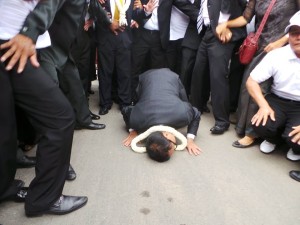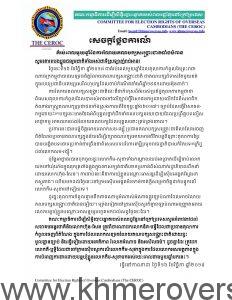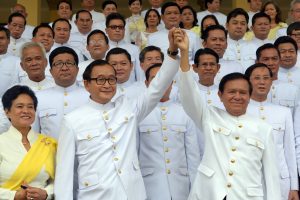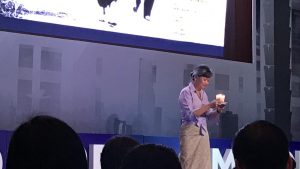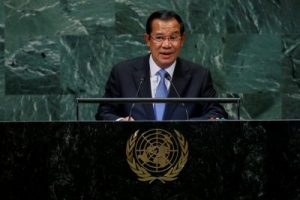RESOLUTION
Of the CNRP Overseas World Conference
in the City of Atlanta, Georgia
1-2 December 2018
- Whereas, Cambodia has fallen into the hand of a dictator, democracy and human rights have been violated and ruined by the dictatorial regime, in breach of the laws and the constitution of the Kingdom of Cambodia as well as the Paris Peace Accord enshrined on the 23rd of October 1991;
- Whereas, the current situation as His Excellency Kem Sokha, President of Cambodia National Rescue Party is unable to exercise his expressions freely as
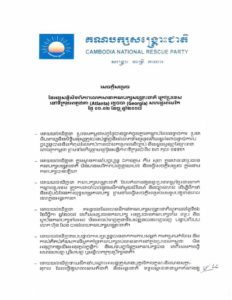 well as to conduct any decision-making on behalf of the party;
well as to conduct any decision-making on behalf of the party;
- Whereas, the Cambodia National Rescue Party which has represented the will of more than half of Cambodian population, needs a staminal and competent leader to lead and to undertake the party strategy, and to make decisions during this transitional period;
- Whereas, the party leadership team as of the 16th of November 2017, especially the party President, the three (3) party Vice Presidents, and the entire party institutions are not able to fulfil their roles in making party functioning after Hun Sen’s regime dissolved Cambodia National Rescue Party;
- Whereas, the current dictatorial regime has increased pressures, threatening, and intimidating millions of supporters of the Cambodia National Rescue Party in Cambodia, to obstructing them from implementing the party’s bylaws and internal rules especially in holding a regular or special convention, or national party congress;
- Whereas, the transitional leader must obtain good leadership qualification and prudent potential who could prove among Cambodian people and international community the credentials and leadership to accept him/her as their representative, must prove on the historical fact (towards the person who has produced great achievement in establishing and leading the party in the past) and credential fact (towards the person whom people have known well and supported the most);
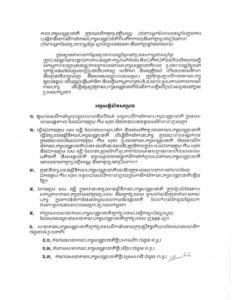 As actual situation inside Cambodia, Cambodian people have been oppressed, threatened and intimidated by the dictatorial regime on a daily basis from carrying out their legitimate activities in the name of Cambodia National Rescue Party. Cambodian people living overseas who value democracy, liberty, and justice, and they have full freedom to express and rights to exercise, as well as the means to fight, they must unite to revitalize the Cambodia National Rescue Party, to initiate and undertake all types of activities in according with the principles of the Cambodia National Rescue Party aiming to bring back life of the Cambodia National Rescue Party in Cambodia.
As actual situation inside Cambodia, Cambodian people have been oppressed, threatened and intimidated by the dictatorial regime on a daily basis from carrying out their legitimate activities in the name of Cambodia National Rescue Party. Cambodian people living overseas who value democracy, liberty, and justice, and they have full freedom to express and rights to exercise, as well as the means to fight, they must unite to revitalize the Cambodia National Rescue Party, to initiate and undertake all types of activities in according with the principles of the Cambodia National Rescue Party aiming to bring back life of the Cambodia National Rescue Party in Cambodia. - Thus, the Resolution was adopted:
- Cambodian people must have a visionary and staminal leader in order to lead Cambodia National Rescue Party during the transitional period while HE Kem Sokha has not received full unrestricted freedom.
- We request HE Sam Rainsy who is a co-founder and a former President of the Cambodia National Rescue Party to be an Acting President of the Cambodia National Rescue Party in order to lead the party during this transitional period while HE Kem Sokha, the President of Cambodia National Rescue Party, is not able to lead the Cambodia National Rescue Party. This request is based on leadership of HE Kem Sokha and HE Sam Rainsy who are the only two (2) persons who have received recognition both domestic and international as the capable top leaders of the Cambodia National Rescue Party according to historical and credential fact.
- The position of Acting President shall become invalid when HE Kem Sokha received full unrestricted freedom.
- HE Sam Rainsy, in his role as an Acting President, will form the party action plans for the operation both inside and outside of Cambodia, and represents the party in communicating with institutions which have been actively seeking political solutions for Cambodia.
- We encourage Cambodia National Rescue Party branches overseas to create an institution with the name of Cambodia National Rescue Party Overseas (CNRP-O).
- Cambodia National Rescue Party branches overseas are led by a governing council comprising seventeen (17) members:
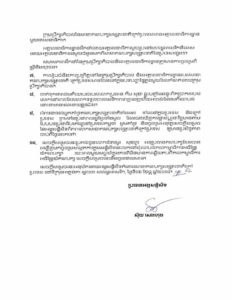 6.1 Representative branches of Cambodia National Rescue Party for the continent of Americas comprising seven (7) members.
6.1 Representative branches of Cambodia National Rescue Party for the continent of Americas comprising seven (7) members.
6.2 Representative branches of Cambodia National Rescue Party for the continent of Europe comprising seven (7) members.
6.3 Representative branches of Cambodia National Rescue Party for the continent of Australia and New Zealand comprising three (3) members.
The governing council of Cambodia National Rescue Party overseas shall have a Secretariat General.
The Secretariat is led by the Secretary General in the United States of America and a group of vice Secretary Generals from Cambodia National Rescue Party branches around the world.
The composition of the Governing Council and the Secretariats are selected among women and the youth.
- The organisation and operation of the Governing Council and the Secretariat of Cambodia National Rescue Party Overseas shall be outlined in the internal rules adopted by the Governing Council.
- It is noted that all opinions of President Kem Sokha shall reflect his true will when he has received full unrestricted freedom and he is able to express his opinions in public on his own.
- We appeal to all supporters of the Cambodia National Rescue Party of both inside and outside the country including the Cambodian people who wish to obtain positive change in Cambodia to support and actively participate in the implementation of resolution of this Cambodia National Rescue Party Overseas World Conference.
- The Resolution is handed to Her Excellency Mu Sochua, the Vice President of the party who has participated as an observer of the Conference to seek advice from the Party Standing (Permanent) Committee. In the event that there is no response within one week from the Party Standing Committee, this Resolution will come into effect.
This Resolution is approved by the Conference presented by chapters delegates of Cambodia National Rescue Party Overseas worldwide in the city of Atlanta, Georgia on December 2nd, 2018
Chair of the Conference
(Signature)
Suy Senghong
Video clips of support from the grassroots leadership through out Cambodia: Part 1 & Part 2

